
New Theatres is an Indian film studio. It was formed in Calcutta by producer B. N. Sircar. It was formed on February 10th, 1931. The company motto was "Jivatang Jyotiretu Chhayam," meaning, "Light infusing shadows with life." Sircar preferred to function roughly analogous to an executive producer. He built a processing laboratory, and acquired staff. Once a film subject was selected and a team assembled to create the picture, Sicar ensured that adequate funds were provided, while refraining from interfering with its execution. He made New Theatres a symbol of Bengali cinema's artistic good taste and technical excellence.

Debaki Bose (1898–1971), also known as Debaki Kumar Bose, was an Indian director, writer, and actor who is recognized for his contribution in Hindi as well as Bengali cinema. He was born on 25 November 1898 in Akalposh,, Burdwan, Bengal Presidency, British India. He died on 17 November 1971 in Calcutta, West Bengal, India. He is known for his innovative use of sound and music in Indian Cinema. He worked first under the banner of British Dominion Films of Dhiren Ganguly and later with Pramathesh Barua's Barua Pictures and finally he joined New Theatres banner in 1932. He started his own production company, Debaki Productions, in 1945.

Anjaan is a 1940 Indian Hindi-language film directed by Amiya Chakrabarty and produced by Bombay Talkies. It was Chakrabarty's first film direction. The film's story and screenplay were by Amiya Chakrabarty, with dialogues by J. S. Casshyap. The cinematography was by the debutant R. D. Mathur. Its music direction was by Pannalal Ghosh, with lyrics by Kavi Pradeep and P. L. Santoshi. The film starred Devika Rani, who had recently returned to films after a two-year absence, following the death of her husband Himanshu Rai in 1940. The cast included Ashok Kumar, David, V. H. Desai, Gulab, Suresh and Om Prakash.
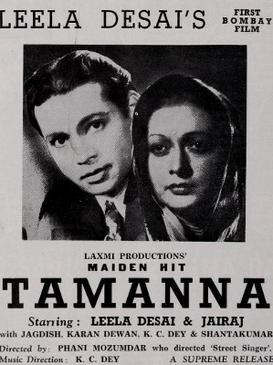
Tamanna is a Bollywood film. It was released in 1942. The film was directed by Phani Majumdar, who also wrote the screenplay, for the Laxmi Productions Ltd. banner. This was the first film from the Laxmi banner, which had been started by Chimanlal Trivedi who earlier headed Circo Productions. Tamanna was also the renowned dancer, Leela Desai's, first film in Bombay. The main cast included Leela Desai, P. Jairaj, Karan Dewan, Jagdish Sethi and K. C. Dey, who besides acting, composed the music. S. K. Kalla wrote the dialogue and lyrics.

Dushman is a 1939 Hindi social romantic drama film. It was directed by Nitin Bose for New Theatres Calcutta Production. The film starred K. L. Saigal, Leela Desai, Najmul Hassan, Prithviraj Kapoor, Nemo and Jagdish Sethi. The music was composed by Pankaj Mullick and the lyrics were written by Arzu Lucknavi. Nitin Bose besides directing also wrote the story and wielded the camera for the film. The dialogue writer was Sudarshan. The story subject about tuberculosis was suggested as a propaganda film by Viceroy Lord Linlithgow and his wife, who were then the Chairman and Patron of King George’s Tuberculosis Fund.

Vidyapati is a 1937 Bengali biopic film directed by Debaki Bose for New Theatres. It starred Pahari Sanyal as Vidyapati. His costars in the film were Kanan Devi, Prithviraj Kapoor, Chhaya Devi, Leela Desai, K. C. Dey and Kidar Sharma. The music was by R. C. Boral and lyrics by Kidar Sharma. Debaki Bose and Qazi Nazrul Islam wrote the story, screenplay and dialogues. The story is about the Maithili poet and Vaishnava saint Vidyapati. The songs of the film became popular and the lyrics though encapsulating Vidyapati's poetry were considered bold for its time. This however ensured the film garnered crowds at the theatres making it a big success of 1937.
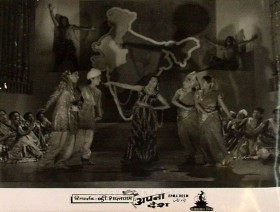
Apna Desh is a 1949 Hindi social drama film set against the backdrop of Partition and directed by V. Shantaram for his Rajkamal Kalamandir banner.
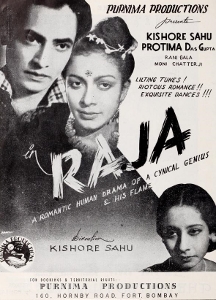
Raja is a 1943 Hindi film directed by Kishore Sahu. It was the first film from the newly established "Purnima Productions". A social satire, it starred Kishore Sahu and Protima Das Gupta in the lead. The music was composed by Khan Mastana, and Kishore Sahu sang the songs picturised on him. The rest of the cast included Ramesh Gupta, Gulab, Moni Chatterjee, Badri Prasad and Rani Bala.

Baghban (transl. Gardener) is a 1938 Indian family drama film directed by A. R. Kardar.

Thokar also called The Kick is a 1939 Indian Hindi-Urdu film directed by A. R. Kardar. Produced by Chandulal Shah for his production banner Ranjit Movietone, it has music by Gyan Dutt. The story writer was M. Sadiq, with cinematography by Gordhanbhi Patel. The cast included Kumar, Ishwarlal, Madhuri, Yakub, Noor Mohammed Charlie, Ram Marathe, Waheedan Bai and Dixit. The story involves a blind villager winning a lottery but he eventually realises that money can not bring happiness.

Dui Purush is a 1945 Bengali language epic family drama film directed by Subodh Mitra. The film was produced by New Theatres and adapted from Tarashankar Bandyopadhyay's novel and popular stage play, with a screenplay by Binoy Chatterjee. The editing was done by Mitra, who was popularly known as Kachi Babu, and cited as one of the best editors in the film industry. The music director was Pankaj Mullick with lyrics by Sailen Roy. The cinematographers were Sudhin Majumdar and Yusuf Mulji. The cast included Chhabi Biswas, Chandrabati Devi, Sunanda Banerjee, Ahindra Choudhury, Tulsi Chakraborty, Jahar Ganguly, and Naresh Mitra.

Jeevan Prabhat is a 1937 Hindi film social drama, produced by Bombay Talkies and directed by Franz Osten. The music director was Saraswati Devi with lyrics and dialogues by J. S. Casshyap. The screenplay was by Niranjan Pal. The film's "star value" was Devika Rani, with Kishore Sahu making his debut as an actor in the film. The cast included another debutant, Renuka Devi, with Mumtaz Ali, Maya Devi and M. Nazir.
![<i>Bhabhi</i> (1938 film) 1938 [[British India]] film](https://upload.wikimedia.org/wikipedia/commons/thumb/5/5f/Bhabhi_1938.jpg/320px-Bhabhi_1938.jpg)
Bhabhi (Sister-in-Law) is a 1938 social family drama Hindi film directed by Franz Osten. The film was based on a Bengali novel written by Sharadindu Bandyopadhyay called "Bisher Dhoan". Bandyopadhyay was a famous Bengali novelist and short story writer also known as the creator of the fictional detective Byomkesh Bakshi. The cinematographers were Wirsching and Pareenja. Dialogues and lyrics by J. S. Casshyap. V. H. Desai, the comedian, got his "big break" in Bhabhi when he joined Bombay Talkies. He became popular as the nervous father of the heroine Renuka Devi. S. N. Tripathi started his acting with a small role in the film. The film had the new found Renuka Devi in the lead.

Surendra was an Indian singer-actor of Hindi films. Known by his mononym, Surendra was born and educated in Punjab to be a lawyer by profession. He came to Bombay to become a singer on the recommendation of a Delhi distributor and his friends. He was "picked" by Mehboob Khan whom he met at Sagar Movietone, to sing and act in films as an alternative to the then Calcutta-based singer-actor, K. L. Saigal. Surendra started his career with his debut starring role in Deccan Queen (1936), directed by Mehboob Khan. He soon became a part of Sagar Movietone when his song "Birha Ki Aag Lagi More Man Mein" from the film became an "instant hit".
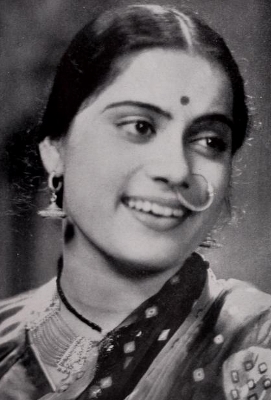
Shanta Apte (1916–1964) was an Indian actress-singer who worked in Marathi and Hindi cinema. Renowned for her roles in films like Duniya Na Mane/Kunku (1937) and Amar Jyoti (1936) under the Prabhat Films banner, she was active in Indian cinema from 1932 to 1958. Apte's impact on Marathi cinema "paralleled" that of Kanan Devi in Bengali cinema. Along with Kanan Devi, Apte is cited as one of the "great singing stars" from before the playback singing era. Apte began her career in films playing the role of a young Radha in the Marathi film Shyamsunder (1932). She joined Prabhat Films acting in her first Hindi language film Amrit Manthan in (1934).
Abhagin is a 1938 Hindi film directed by Prafulla Roy for New Theatres Ltd., Calcutta. A bilingual, it was made in Bengali language as Abhigyan. The film was based on a story by Upendranath Ganguly, with dialogue by A. H. Shore. R. C. Boral provided the music composition with lyrics for the Hindi version by Munshi Arzu, and by Ajoy Bhattacharya for the Bengali. The screenplay was by Phani Majumdar for whom it was his first independent film as a scriptwriter. Bimal Roy, who was to make a name for himself as a prominent Bengali and Hindi director, was the cinematographer for the film. The cast included Molina Devi, Prithviraj Kapoor, Vijay Kumar, Nemo and Bikram Kapoor.

Bibbo was a music composer, singer and actress who worked in both Indian and Pakistani films. She acted in Indian cinema from 1931 to 1947 before moving to Pakistan, following Partition of India in 1947. She started her acting career with Ajanta Cinetone Ltd. in 1933, working with directors like M. D. Bhavnani and A. P. Kapoor. She was one of the top leading ladies of the 1930s along with actresses like Devika Rani, Durga Khote, Sulochana, Mehtab, Shanta Apte, Sabita Devi, Leela Desai and Naseem Banu. She was referred to as "one of the most important female stars of the 1930s and 1940s". Her fame had her featured in the lyrics of a popular song from the film Gharib Ke Lal (1939) sung by Mirza Musharraf and Kamla Karnataki, with music by Sagheer Asif and lyrics by Rafi Kashmiri. "Tujhe Bibbo Kahoon Ke Sulochana", where Sulochana referred to another popular actress of the time. This was the first time a song featuring famous actors was used in the lyrics of a film song.

Chaturbhuj Doshi (1894–1969) was a Hindi and Gujarati writer-director of Indian cinema. He was one of the top Gujarati screenplay writers, who helped script stories for the Punatar productions. He is stated to be one of the leading figures who launched the Gujarati film industry with work on notable films like Gunsundari (1948) and Nanand Bhojai (1948). Doshi, was “well known” for his family socials and had become “a celebrity in his own right”. He made a name for himself as a journalist initially and was referred to as the "famous journalist" and publicist by Baburao Patel, editor of Filmindia.
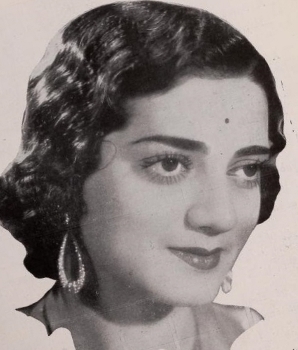
Sabita Devi (1914–1965) was a Hindi film actress in Indian cinema. She is stated to be one of the "prominent" leading ladies of the "pioneering era" of Indian cinema along with Mehtab, Bibbo, Durga Khote, Gohar, Devika Rani and Seeta Devi. A Jewish by birth, she changed her name to find acceptability in Hindi cinema like the other Anglo-Indian and Jewish actresses of her time, Sulochana, Seeta Devi, Madhuri, and Manorama. After initially working with British Dominion Films Ltd., Calcutta, she shifted to Bombay and performed mainly in films produced by Sagar Movietone with her co-star in most films being Motilal. Some of the popular films with Motilal were Dr. Madhurika (1935) and Kulvadhu (1937) directed by Sarvottam Badami. Their first film together was Shaher Ka Jadoo (1934), which was also Motilal's debut film, and then Lagna Bandhan (1936) both directed by Kaliprasad Ghosh. She acted in Silver King (1935) with Motilal. It was an action film directed by C. M. Luhar, which became a "huge success".

Mazhar Khan was an actor, producer, and director in Indian Cinema. He began his career as a police officer, which he left to study law for a short period. After abandoning his studies, he came to Bombay and started his career in cinema with the silent film Fatal Garland (1928) opposite the top actress of the time, Ermeline. He became a popular actor, gaining success in several silent films. During his stint in silent films he worked with directors such as Bhagwati Prasad Mishra, Ezra Mir, Moti P. Bhagnani, R. S. Chowdhary, and M. D. Bhavnani. Magazines in the 1940s compared Khan to Hollywood actors such as Paul Muni, Bela Lugosi and Boris Karloff.













![<i>Bhabhi</i> (1938 film) 1938 [[British India]] film](https://upload.wikimedia.org/wikipedia/commons/thumb/5/5f/Bhabhi_1938.jpg/320px-Bhabhi_1938.jpg)





